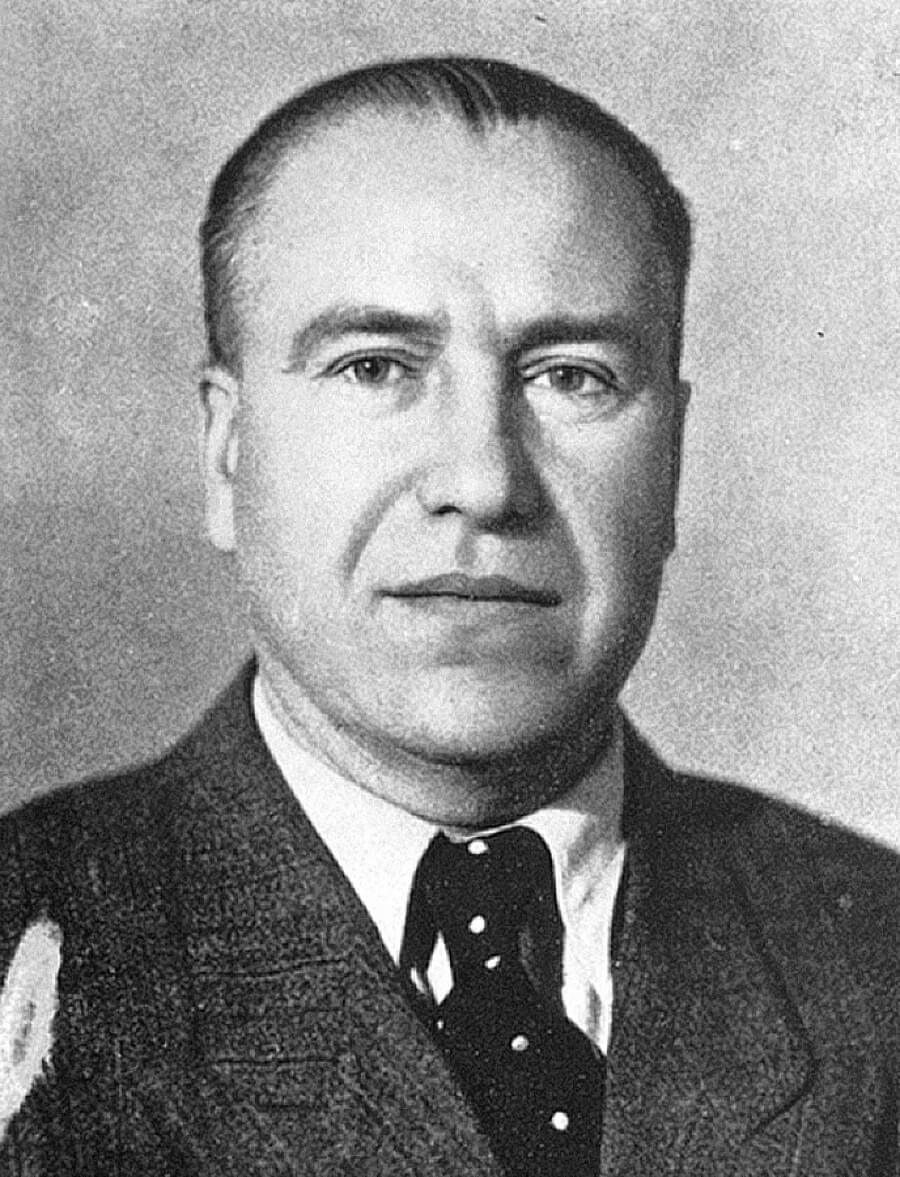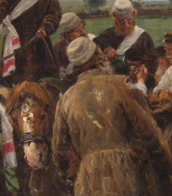alexandre alexandrovitch deïneka (1899 - 1969)

Aleksandr Aleksandrovich Deyneka (Russian: Алекса́ндр Алекса́ндрович Дейне́ка) was a Soviet Russian artist, celebrated for his significant contribution to the world of modernist figurative painting in the first half of the 20th century. Born into a Ukrainian origin, Deyneka's artistry spanned painting, graphic design, and sculpture, leaving an indelible mark on Russian modernism. His works, characterized by vivid movement and an innovative portrayal of the Soviet lifestyle, include iconic pieces such as "The Defense of Sevastopol," "Collective Farmer on a Bicycle," and "Future Pilots," which showcase the dynamism and spirit of the Soviet era. Deyneka's commitment to Social Realism—a style aimed at the accessible portrayal of everyday life—earned him both national and international acclaim. His murals and mosaics for public buildings and metro stations in Moscow, like the Mayakovskaya station, underline his influence on the Soviet visual landscape and contribute to his legacy as a pioneer of a style that bridged European innovation with Soviet themes.
Deyneka's journey began with his education at the VHUTEMAS, where he was influenced by figures such as Mayakovsky, which shaped his approach to art as a tool for societal influence and expression. His artworks, permeated with themes of labor, sports, and a forward-looking optimism, reflect the Soviet Union's utopian ambitions and the complexities of its societal structure. Notably, Deyneka's "Mother" stands out as a powerful symbol of the Soviet woman, intertwining high social awareness with the natural role of motherhood, highlighting the artist's nuanced approach to depicting Soviet life.
Throughout his career, Deyneka remained a formidable figure in art, navigating through various artistic societies and contributing to magazines and posters that defined the visual narrative of the Soviet Union. His travels to Italy, France, and the US broadened his perspective, enriching his work with international influences while retaining his distinct stylistic identity. Deyneka's decorations for the Moscow Metro not only won prestigious awards but also immortalized his vision of Soviet progress and optimism, capturing the essence of an era poised between grand aspirations and complex realities.
For art collectors and enthusiasts of Russian modernism, Deyneka's works offer a window into the vibrancy and ideological fervor of the Soviet Union, embodying the era's aesthetic and thematic aspirations. His contributions to the public and artistic spheres underscore the role of art in shaping and reflecting societal values, making his oeuvre a vital point of study for anyone interested in the intersections of art, history, and society.
To stay informed about exhibitions and auctions featuring Aleksandr Aleksandrovich Deyneka's work, sign up for updates. This subscription ensures you're always in the know about new sales and events related to this iconic artist, allowing you to deepen your appreciation and possibly enhance your collection.


Aleksandr Aleksandrovich Deyneka (Russian: Алекса́ндр Алекса́ндрович Дейне́ка) was a Soviet Russian artist, celebrated for his significant contribution to the world of modernist figurative painting in the first half of the 20th century. Born into a Ukrainian origin, Deyneka's artistry spanned painting, graphic design, and sculpture, leaving an indelible mark on Russian modernism. His works, characterized by vivid movement and an innovative portrayal of the Soviet lifestyle, include iconic pieces such as "The Defense of Sevastopol," "Collective Farmer on a Bicycle," and "Future Pilots," which showcase the dynamism and spirit of the Soviet era. Deyneka's commitment to Social Realism—a style aimed at the accessible portrayal of everyday life—earned him both national and international acclaim. His murals and mosaics for public buildings and metro stations in Moscow, like the Mayakovskaya station, underline his influence on the Soviet visual landscape and contribute to his legacy as a pioneer of a style that bridged European innovation with Soviet themes.
Deyneka's journey began with his education at the VHUTEMAS, where he was influenced by figures such as Mayakovsky, which shaped his approach to art as a tool for societal influence and expression. His artworks, permeated with themes of labor, sports, and a forward-looking optimism, reflect the Soviet Union's utopian ambitions and the complexities of its societal structure. Notably, Deyneka's "Mother" stands out as a powerful symbol of the Soviet woman, intertwining high social awareness with the natural role of motherhood, highlighting the artist's nuanced approach to depicting Soviet life.
Throughout his career, Deyneka remained a formidable figure in art, navigating through various artistic societies and contributing to magazines and posters that defined the visual narrative of the Soviet Union. His travels to Italy, France, and the US broadened his perspective, enriching his work with international influences while retaining his distinct stylistic identity. Deyneka's decorations for the Moscow Metro not only won prestigious awards but also immortalized his vision of Soviet progress and optimism, capturing the essence of an era poised between grand aspirations and complex realities.
For art collectors and enthusiasts of Russian modernism, Deyneka's works offer a window into the vibrancy and ideological fervor of the Soviet Union, embodying the era's aesthetic and thematic aspirations. His contributions to the public and artistic spheres underscore the role of art in shaping and reflecting societal values, making his oeuvre a vital point of study for anyone interested in the intersections of art, history, and society.
To stay informed about exhibitions and auctions featuring Aleksandr Aleksandrovich Deyneka's work, sign up for updates. This subscription ensures you're always in the know about new sales and events related to this iconic artist, allowing you to deepen your appreciation and possibly enhance your collection.




